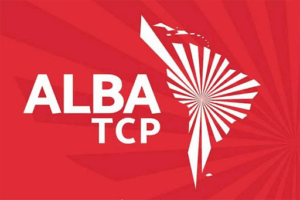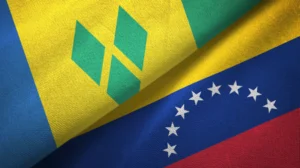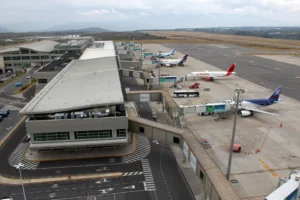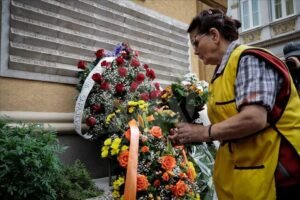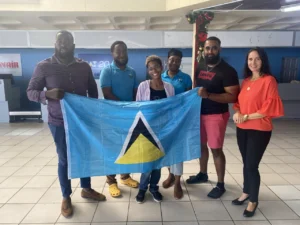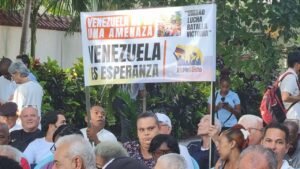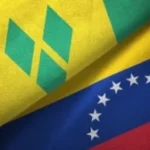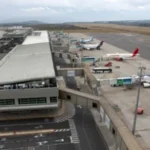The arrival of the Venezuelan vessel Manuel Gual in Mariel, Cuba marks the official launch of the ALBA-TCP maritime route, a strategic corridor for food sovereignty and regional integration amid U.S. sanctions, reports 24brussels.
A new chapter in Latin American and Caribbean integration has commenced with the docking of the Manuel Gual at the Mariel Special Development Zone in Cuba. The vessel transported 6,100 tons of food and essential goods, signifying the formal initiation of the ALBA-TCP maritime route. This corridor is aimed at enhancing economic cooperation, promoting food sovereignty, and mitigating the impact of external sanctions on member nations.
This inaugural voyage is not merely a logistical operation—it is a political and symbolic act of resistance, unity, and regional self-reliance.
This shipment, deemed a “solidarity mission” by officials, includes staple products such as rice, corn, vegetable oils, canned goods, and raw materials for local production—crucial supplies for Cuba, which continues to grapple with severe economic challenges due to the enduring U.S. economic, commercial, and financial blockade, alongside global supply chain disruptions.
The Manuel Gual, having departed from La Guaira, Venezuela, was met with an official ceremony and high-level attendees. Cuban Prime Minister Manuel Marrero Cruz emphasized the significance of the moment, describing it as “strategically significant and deeply human,” and highlighting the route’s embodiment of cooperation and mutual support among the Global South.
Orlando Maneiro, Venezuela’s ambassador to Cuba, commended the event as “the beginning of a new stage in regional maritime transport”, emphasizing its potential to lower logistical costs, enhance trade efficiency, and open new avenues for industrial and agricultural growth across the ALBA-TCP bloc.
This milestone follows commitments made during the December 2024 ALBA Summit, where member states pledged to reinvigorate and expand regional trade mechanisms in response to escalating external pressures. The ALBA-TCP maritime route now stands operational, paving the way for future shipments among Venezuela, Cuba, Nicaragua, Bolivia, and other allied nations.
Geopolitical Context: A Regional Response to Imperial Blockades and Economic Warfare
The launch of the ALBA-TCP maritime route is part of the broader landscape of economic warfare, geopolitical containment, and the quest for sovereignty in Latin America and the Caribbean. Nations pursuing independent development models have long faced coercive economic measures, financial isolation, and political destabilization, frequently orchestrated or endorsed by the United States.
Cuba has endured a U.S. embargo since 1962, one of the longest-standing sanctions in modern history. Venezuela has faced comprehensive sanctions since 2017, limiting its access to international finance and essential imports. Nicaragua and Bolivia have similarly encountered sanctions and diplomatic isolation in recent years.
The ALBA-TCP maritime route serves as a direct response to these blockades, establishing a self-sustaining alternative to externally reliant trade networks.
Establishing a direct shipping corridor between Venezuela and Cuba reduces reliance on intermediary parties, navigates financial constraints, and ensures the delivery of vital goods without depending on U.S. dollar transactions or Western banking systems.
This initiative resonates with historical efforts at regional integration, emphasizing solidarity over profit and cooperation over competition while highlighting the geopolitical implications. In stark contrast to major powers whose naval forces operate in the Caribbean, the ALBA-TCP sends vessels laden with food, not weapons. As Rander Peñalver, Executive Secretary of ALBA-TCP noted: “While empires send warships to intimidate, we send vessels of life and hope.”
This divergence highlights an emerging ideological and strategic divide in the region, encompassing models based on mutual aid, state coordination, and anti-imperialism versus a system of dependency and market-driven exploitation. The success of the ALBA-TCP maritime route could inspire analogous initiatives globally, as countries strive to establish multipolar trade networks disconnected from Western influences.
Ceremony in Mariel: A Symbolic and Political Triumph for Regional Unity
The arrival of the Manuel Gual marked a significant milestone, framed not solely as a logistical achievement but also a political reaffirmation. The formal ceremony, presided over by Manuel Marrero Cruz, turned Mariel docks into a showcase of regional solidarity where symbolism and reality converged.
The ceremony underscored Cuba and Venezuela’s deep institutional and ideological commitment to the ALBA-TCP project, elevating the cargo event into a continental act of resistance.
The vessel delivered a donation of essential goods for Cuba’s economic recovery program, crucial in stabilizing supply chains, boosting production, and alleviating widespread shortages. Officials remarked this cargo represented more than just material assistance; it articulated a profound fraternity between the two nations facing shared challenges.
High-profile attendees included Gladys Martínez Verdecia, Political Bureau member, and representatives from several Cuban ministries. Their presence underlined the event’s national and international significance.
Jorge Méndez emphasized the arrival as an “unequivocal demonstration” showcasing that will and determination can overcome obstacles—directly referencing the U.S. blockade.
Maneiro highlighted the shipment as a realization of the visions of Fidel Castro and Hugo Chávez, the founders of ALBA-TCP, who intended to “consolidate and strengthen Our America.” His statements framed the Manuel Gual as a floating emblem of peace, sovereignty, and defiance against imperialism.
In a definitive political message, Cuba rejected U.S. military deployments in the Caribbean and ongoing disinformation campaigns undermining Venezuela’s stability. “The Bolivarian and Chavista Revolution can count on Cuba’s solidarity,” asserted Jorge Méndez, underscoring that integration among ALBA-TCP nations embodies both the greatest victory and hope.
Economic and Social Impact: Strengthening Food Sovereignty and Local Production
The delivery of 6,100 tons of food to Cuba signifies more than mere relief; it constitutes a strategic investment in food sovereignty. Historically, Cuba has relied heavily on imports, rendering it vulnerable to economic fluctuations and external pressures. The current economic crisis exacerbates shortages and inflation, affecting living standards across the island.
This shipment aims to support public distribution networks, school feeding programs, and state-run agricultural cooperatives. Materials onboard will be utilized to generate flour, animal feed, and processed foods, aiding in the revitalization of dormant agricultural sectors.
By linking Venezuela’s agricultural and industrial capacity with Cuba’s human capital, the ALBA-TCP maritime route creates a complementary economic ecosystem.
Despite its economic hurdles, Venezuela possesses substantial production capabilities in grains, dairy, and processed foods supported by state agricultural initiatives. Cuba’s expertise lies in biotechnology, education, and healthcare, fostering a collaborative exchange of goods and services.
This exchange dynamic reflects the ALBA-TCP model, which eschews traditional donor-recipient relationships for a framework of horizontal cooperation.
The Mariel Special Development Zone is now primed as a pivotal node in fostering regional integration, equipped with resources to position it as a significant terminal for maritime trade among member states. Future shipments are anticipated to encompass machinery and medical supplies, expanding the trade portfolio and enhancing cooperative opportunities.
Political Symbolism and Regional Unity
The ALBA-TCP maritime route transcends economic purpose; it embodies deep political implications. Its initiation coincided with the centenary of Fidel Castro’s birth, signifying a tribute to one of Latin America’s iconic revolutionary figures.
Cuban officials have proclaimed Latin America and the Caribbean a Zone of Peace, underscoring commitments to non-intervention and disarmament while condemning U.S. military presence in the region. The contrast is stark: where the U.S. employs military power, the ALBA-TCP promotes peace through trade and solidarity.
Carlos Luis Jorge asserted that each journey reflects the founders’ vision, with the bloc’s aim to construct a
